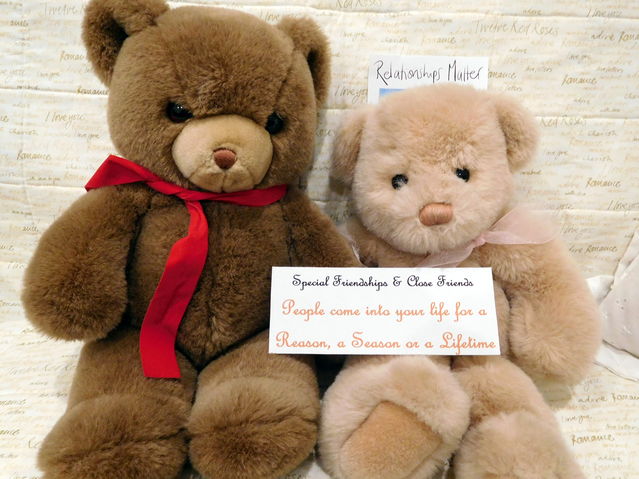Relationships
Sources and Characteristics of Close Relationships
How to define, allow, develop, and honor the special friendships that nourish us
Posted November 9, 2016

Who is the person you feel closest to, the one you call to share cheers with when your child gets a college acceptance or tears when your work project is sent back to the drawing board? When the dog breaks a leg and you need to go to the vet, who do you ask to accompany you? When your parents unexpectedly give you tickets for a show you have been yearning to see, what faces pop into your mind as favorite companions? What cues unconsciously place a person on your radar for constant monitoring when he or she becomes ill? Who comes to mind when you need a ride to a medical procedure and are forced to ask for help? Whose birth date will you never forget, no matter how many years go by? Where did these people come from?
Family can yield friends. Many of us look first for close relationships in our own history or where we live. Family. A spouse. Perhaps a relative who has died. (Even though it was thirty-two years ago now, I still occasionally hold conversations in my head with my deceased husband). Children can be close, some more than others, and some more or less after they are grown and have their own adult lives. You can feel close to a child’s spouse and any grandchildren he or she may have—again, some closer than others, or close in different ways. But family or residential ties don’t automatically make people close to one another, nor does a lack of conflict. Relationships can be casual or cordial, but definitely not “close”. Think of the great-aunt you dutifully visit once a year or the sibling or other relative who treats your home like a hotel.
“Family by choice” includes close friends, the people you can call in the middle of the night. Those whose faces or voices come to mind when you hear a song, see a photo, remember a particularly emotional moment. With whom you celebrate the good or commiserate the sad or disappointing. With whom you clocked a period of significant personal growth or history and, having shared those moments of transition or crisis, have chosen to continue to keep in touch, to follow one another’s life at close range. The people who appear in your dreams at night, at least the happier ones.
Other routes to closeness. Close friendships can develop out of repeated contact, a perceived similarity, or a mysterious connection that brings people from two different worlds together and compels them to enter each other’s life. They can last for an hour, a day, or a lifetime. They reflect "perceived partner responsiveness." Their presence makes your life different, reminding you of where you are at the moment, who you have been, or want to be. Antoine de Saint-Exupéry said “A goal without a plan is just a wish.” A close person is the person with whom you can share a goal, create and test a plan, and observe with wonder as the trajectory unfolds.
Definitions. Why do we label people “close”? Sharing. Close friends are people with whom we share more than information. More even than an interest, activity, or even passion, although the friendship may have begun with that similarity. Sharing probably includes companionship, someone you like to spend real time with. Supporting, whether the resources provided are financial, logistical, emotional or social. Inspiration or at least appreciation of each other’s growth. Comforting. Being there when times are challenging. Being generous. People in close relationships give to one another. Knowledge. Insight. Laughter. Possessions. Time. Respect for differences. Close friends are trustworthy, reliable, and forgiven when they are human, fallible. They are valued not only for what they bring to the table but for who they are in their own right, for what they bring to the world. Confiding. Perhaps they are people you can confide in and whose confidences you, in turn, hold. A relationship in which you can speak the unspeakable and feel heard and perhaps even understood. Someone with whom secrets can be put into words and brought to the light of day where they can be examined, perhaps updated and revised, or foolish beliefs confronted.
Life can be filled with lost opportunities for close relationships. The neighbor you wished you had known when you listened to others describe her at her funeral. The person whom you sat next to in a class or with whom you played on the same team or stretched at the same yoga studio but never did get to know.
And then there is the dark side of close relationships, which rears its head when trust is breached, a confidence or agreement betrayed. Or when the support that is needed is beyond what can be provided, and the one in need feels disappointed by the one with finite material or emotional resources, at least at a particular moment in his or her life. Or when unvoiced expectations lead to misunderstanding of what time, energy or affection is truly available in any specific instance or over time. When two people grow in different directions and the lingering basis of the bonds, usually family or history, no longer suffice to provide a well of sustenance to those involved. When the balance of giving and receiving becomes too burdensome to either party and a new way of being with one another cannot be created. The possibility of losing a close relationship can be so frightening, so ridden with potential sadness, that some people avoid them altogether. They miss the joys and other benefits that they can bring.
Ten Characteristics of Close Relationships
- They can last an hour, a day, a lifetime.
- They can appear in your life to teach you, to help you, to love you, to support you, to inspire you, to comfort you, to bring you joy, or to test you.
- They can begin in family, which is not chosen, or in a relationship that is,
- They can develop through sharing important growth or trauma; pursuing an interest or activity or passion; enjoying the attraction, validation, or comfort of a perceived similarity; through the intrigue of respected differences; or in the magnetism that mysteriously draws people towards one another.
- They can bring moments that evoke the full spectrum of emotion, thus expanding and deepening our human repertoire.
- They can place demands on you that help you use your resources well, help you grow, or overwhelm you. They come with expectations, that can sometimes be negotiated.
- They can be interrupted or ended by disappointment, unresolved conflict, betrayal, growing distance in the interest or activity or similarity that initially brought you together, or just by two people developing in different directions.
- Their benefits can include providing help, a confidant, a second pair of ears for hearing anxiety-provoking information, companionship, being able to use meaningful parts of the self to serve another person.
- Without maintenance, they deteriorate. Like everything else, attention is required to avoid the need for repairs—always more costly in time, money and energy—and sometimes not even possible.
- They hold up a mirror so that we can see and develop ourselves more broadly, more deeply. On the other side of the mirror, they allow us to act as agents for inspiration, for growth.
- The foundation of a close relationship is trust; its lifeline is forgiveness when the other disappoints.
Close relationships can usually — but not always — brave assaults from disapproving relatives, jealous others, differences in perspectives, physical distance, and disappointment. The track record that renders someone a “safe harbor” in times of trouble or a cheerleader in times of joy earns him or her a place in your heart worth occasional sacrifice and enduring honor. Wise words from a Linda Worster song, “That’s All”, bear remembering: “I just love you because you are you.”
Reis HT, Clark MS, Holmes JG. Perceived partner responsiveness as an organizing construct in the study of intimacy and closeness. In: Mashek DJ, Aron AP, editors. Handbook of closeness and intimacy. Mahwah, NJ: US: Lawrence Erlbaum Associates Publishers; 2004. pp. 201–225
Copyright 2016 Roni Beth Tower
Visit me at www.miracleatmidlife.com.




